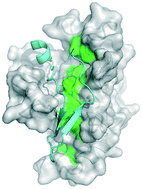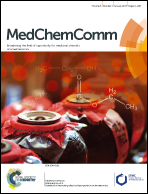Antimalarial drug discovery targeting apical membrane antigen 1†
Abstract
Malaria continues to frustrate humanity's attempts to eradicate this deadly disease. Although gains have been made over the last 15 years, drug resistance to malaria continues to be a major concern. The lack of new antimalarials with novel mechanisms of action continues to challenge the scientific community to find innovative targets to combat this persistent disease. One such target, apical membrane antigen 1 (AMA1), is an essential protein that helps the parasite invade host erythrocytes. Recently, a number of efforts have focused on the druggability of this target, aiming to block the interactions of AMA1 that mediate invasion of host cells. This review covers recent progress in drug discovery targeting this crucial protein–protein interaction in malaria.



 Please wait while we load your content...
Please wait while we load your content...